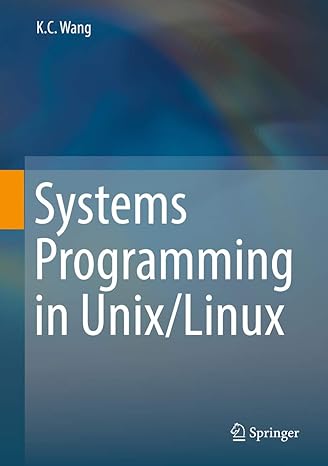
|
FreeComputerBooks.com
Links to Free Computer, Mathematics, Technical Books all over the World
|
|
- Title: Systems Programming in Unix/Linux
- Author(s) K.C. Wang
- Publisher:Springer; 1st ed. (September 10, 2018); eBook (Online Edition by Open Course Hub)
- Paperback: 473 pages
- eBook PDF
- Language: English
- ISBN-10: 3319924281
- ISBN-13: 978-3319924281 :

|
Covering all the essential components of Unix/Linux, including process management, concurrent programming, timer and time service, file systems and network programming, this textbook emphasizes programming practice in the Unix/Linux environment.
About the Authors- K.C. Wang is currently a Professor in the School of Electrical Engineering and Computer Science at Washington State University.
 Similar Books:
Similar Books:
-
 Linux/UNIX System Programming Essentials (Michael Kerrisk)
Linux/UNIX System Programming Essentials (Michael Kerrisk)
This book attempts to capture the engineering wisdom and design philosophy of the UNIX, Linux, and Open Source software development community, and as it is applied today by the most experienced programmers.
-
 Linux System Programming (Robert Love)
Linux System Programming (Robert Love)
Write software that draws directly on services offered by the Linux kernel and core system libraries. This book provides you with a tutorial on Linux system programming, a reference manual on Linux system calls, and an insider’s guide to writing smarter, faster code.
-
 The Art of UNIX Programming (Eric Steven Raymond)
The Art of UNIX Programming (Eric Steven Raymond)
Covering all the essential components of Unix/Linux, including process management, concurrent programming, timer and time service, file systems and network programming, this textbook emphasizes programming practice in the Unix/Linux environment.
-
 The Linux Programming Interface: System Programming
The Linux Programming Interface: System Programming
This book is the definitive guide to the Linux and UNIX programming interface - the interface employed by nearly every application that runs on a Linux or UNIX system. It provides detailed descriptions of the system calls and library functions.
-
 The Linux Kernel Module Programming Guide (Peter Salzman)
The Linux Kernel Module Programming Guide (Peter Salzman)
This book is an excellent guide for people who want to write kernel modules. It takes a hands-on approach starting with writing a small "hello, world" program, and quickly moves from there. Far from a boring text on programming,
-
 Advanced Linux Programming (Mark L. Mitchell, et al)
Advanced Linux Programming (Mark L. Mitchell, et al)
This book focuses mostly on the Application Programming Interface (API) provided by the Linux kernel and the C library. It contains a preliminary introduction to the development tools available.
-
 An Introduction to GCC: for the GNU Compilers GCC and G++
An Introduction to GCC: for the GNU Compilers GCC and G++
This book provides a complete tutorial introduction to the GNU C/C++ compilers, gcc and g++. GCC is the defacto compiler collection for hundreds of thousands of open source and commercial projects worldwide, and is the standard compiler for academic programs.
-
 O'Reilly® UNIX Systems Programming for SVR4 (David A. Curry)
O'Reilly® UNIX Systems Programming for SVR4 (David A. Curry)
This book gives you the nitty-gritty details on how UNIX interacts with applications. If you're writing an application from scratch, or if you're porting an application to any System V Release 4 (SVR4) platform, you need this book.
-
 Unix System Programming in OCaml (Xavier Leroy, et al)
Unix System Programming in OCaml (Xavier Leroy, et al)
This book is an introductory course on Unix system programming, with an emphasis on communications between processes, using OCaml. This gives an unusual perspective on systems programming and on the ML language.
-
 O'Reilly® Using C on the UNIX System (David A. Curry)
O'Reilly® Using C on the UNIX System (David A. Curry)
This book provides a thorough introduction to the UNIX system call libraries. It is aimed at programmers who already know C, but who want to take full advantage of the UNIX programming environment.
-
 FreeBSD System Programming (Nathan Boeger, et al)
FreeBSD System Programming (Nathan Boeger, et al)
This book is intended as a resource to system programming on BSDs. The reader should be familiar with basic programming in C or C++. The information in this book might be aimed toward the beginning programmer - indeed, it could serve useful for the programmer unfamiliar with the FreeBSD platform.
-
 O'Reilly® Linux Device Drivers, 3rd Edition (Jonathan Corbet)
O'Reilly® Linux Device Drivers, 3rd Edition (Jonathan Corbet)
The 3rd edition of Linux Device Drivers is better than ever. The book covers all the significant changes to Version 2.6 of the Linux kernel, which simplifies many activities, and contains subtle new features.
-
 O'Reilly® Linux Device Drivers, 2nd Edition (Alessandro Rubini)
O'Reilly® Linux Device Drivers, 2nd Edition (Alessandro Rubini)
This book is for anyone who wants to support computer peripherals under the Linux operating system or who wants to develop new hardware and run it under Linux. It provides insights into address spaces, asynchronous events, and I/O.
-
 O'Reilly® Linux Kernel in a Nutshell (Greg Kroah-Hartman)
O'Reilly® Linux Kernel in a Nutshell (Greg Kroah-Hartman)
Written by a leading developer and maintainer of the Linux kernel,this bookl is a comprehensive overview of kernel configuration and building, a critical task for Linux users and administrators.
-
 Linux Kernel Crash Book (Igor Ljubuncic)
Linux Kernel Crash Book (Igor Ljubuncic)
For systems and network administrators and technical support engineers responsible for maintaining Linux systems and networks, this is a first aid guide, it provides quick solutions to a variety of Linux system and network problems.





